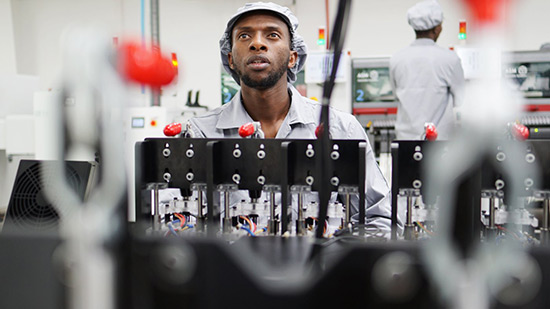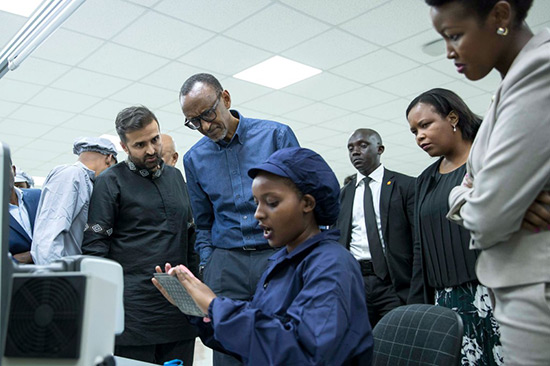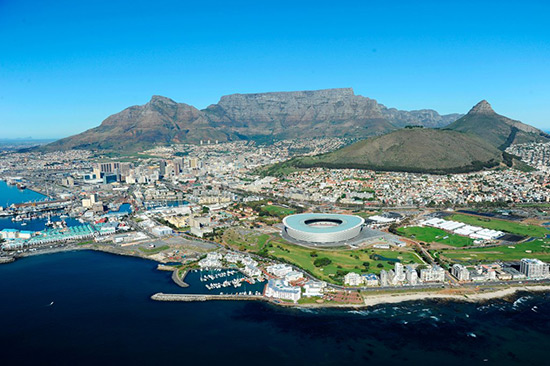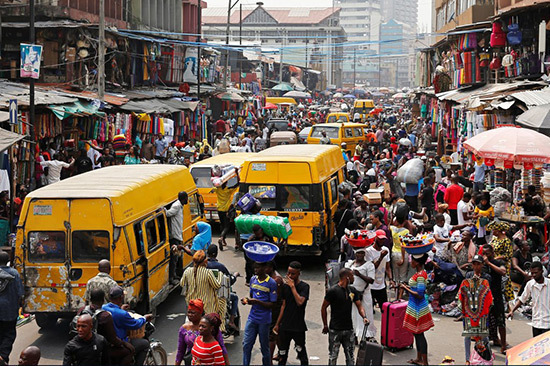非洲硅谷誕生記

|
去年10月,當第一座“非洲制造”手機工廠出現在盧旺達首都基加利時,它帶來的不光是意外——該廠的產品還搭載了用于屏幕解鎖的指紋傳感器等高端設備,而目前非洲大陸普遍使用的其他手機還不具備這樣的功能。 它提升的不僅是非洲科技,還有非洲質量。 這座工廠屬于盧旺達公司Mara Group,是基加利的一個重要里程碑。這座城市花了幾十年時間從1994年的種族大屠殺中重生,繼而成為一個科技樞紐。它已經設立了幾個科技公司孵化器、卡內基梅隆大學的一所工程學院以及一些初創公司,其產品包括無人機和無現金支付系統。 盧旺達科技部部長寶拉·因加比萊說:“這要歸結于我們動蕩的過去,什么也沒有留下,而我們用灰燼作為團結的建設工具。” 受貧困、奴隸貿易和殖民主義的遺留問題影響,非洲直到最近仍然被排除在全球科技熱潮之外。但這片大陸正越來越成功地孕育出科技初創企業,并且引進了大型的外國科技公司。 去年11月,Visa向尼日利亞支付公司Interswitch投資2億美元。幾乎同期,隸屬于一家挪威公司但總部設在拉各斯的移動支付服務商OPay融資1.2億美元,投資者包括紅杉資本和軟銀亞洲風投等知名機構。2019年5月,微軟在肯尼亞和尼日利亞設立辦事處,供工程師在人工智能、機器學習和混合現實領域開展工作。而一個月前,谷歌在加納建立了一處人工智能實驗室。 推特及支付終端制造商Square的首席執行官杰克·多爾西于去年11月在推特上表示,2020年他將在非洲逗留六個月。多爾西說:“非洲將定義未來。” 不過,非洲正在成長的科技行業體量依然很小,而且在許多方面都受到一些非常明顯的現實問題制約。近6億非洲人無電可用,包括撒哈拉以南三分之二的人口,而且85%的非洲居民的日均生活開支還不到5.5美元(人民幣38.3元)。 無論設在何地,初創公司總會不可避免地遇到經營問題,而這讓上述挑戰變得更加復雜。舉例來說,尼日利亞的在線零售商Jumia Technologies于去年4月成為第一家在紐約證券交易所上市的非洲科技公司,但它最近關閉了坦桑尼亞和喀麥隆的電商業務以及盧旺達的食品快遞服務。截至去年12月中旬,該公司的股價已經從最高點下滑87%。 好的一面是風投資金渠道不斷拓寬。2018年,投資者向非洲的初創企業投入了12億美元資金,是兩年前的三倍以上。 非洲的新加坡 在所有涉足科技領域的非洲國家中,盧旺達最為出色。這個多山國家有1200萬人,面積和美國的馬里蘭州差不多。盧旺達的科技行業集中在被世界經濟論壇譽為“全球最干凈城市”的基加利。 盧旺達對科技的推動已經吸引了拉各斯設計實驗室Co-Creation Hub、斯德哥爾摩共享辦公及投資基金Norrsken以及卡內基梅隆大學,后者于2011年在盧旺達設立了可以容納300名畢業生的學院,又在去年11月進行了升級。 長期以來,盧旺達總統保羅·卡加梅一直表示他的目標是讓盧旺達成為非洲的新加坡。但盧旺達更像是非洲的愛沙尼亞——對歐洲蓬勃發展的科技行業來說,愛沙尼亞是強大而實用的后端“機器”。 盧旺達向科技公司毛遂自薦的理由之一是它沒有繁瑣的行政程序。世界銀行的數據顯示,盧旺達的營商便利程度居全球第38位,在非洲國家中排名榜首,而且超過了荷蘭(42位)、印度(63位)和巴西(124位);美國排在第6位。 雖然按照西方標準,盧旺達的政治自由度仍然有限,但其社會一直在進步。例如,61%的國會議員為女性,占比居全球首位。2017年,盧旺達將斯瓦希里語定為官方語言之一,目的是更好地與鄰國融合。 無論盧旺達做什么,顯然都在獲得回報。去年11月,國際貨幣基金組織將盧旺達2019年經濟增速預期上調至8.5%的高點,而此前7.8%的增長預期已經較為強勁。 1996年成立的Mara Group正在設法利用盧旺達經濟的快速發展以及非洲很大一部分地區的類似成就。該公司有兩款安卓智能手機——基本款定價159美元,高端款定價229美元,意圖與韓國三星以及中國華為和傳音的較便宜機型相抗衡。 |
When a factory in Rwanda’s capital of Kigali debuted Africa’s first made-in-Africa mobile phones in last October, their provenance wasn’t the only surprise: The devices also came loaded with higher-end features like fingerprint sensors for unlocking the screen that many rival phones used across the continent lack. It wasn’t just a push for African tech but also for African quality. The factory, owned by Rwandan company Mara Group, was a major milestone for Kigali, which has spent a generation emerging from the ashes of the nation’s genocide in 1994 by refashioning itself as a tech hub. Already, the city is home to several tech incubators, a Car?negie Mellon University engineering campus, and local startups that produce such items as drones and cashless payment systems. “It boils down to our turbulent past, being left with nothing, and using ashes as a construction tool for unity,” says Paula Ingabire, Rwanda’s tech minister. Hamstrung by poverty and the legacies of the slave trade and colonialism, Africa had, until recently, been left largely behind by the global tech boom. But increasingly, it’s having success nurturing tech startups and attracting major foreign tech companies. In last November, Visa invested $200 million in Nigerian payments firm Interswitch at around the same time that OPay, a Norwegian-owned but Lagos-based mobile payment service, raised $120 million from high-profile investors including Sequoia Capital China and SoftBank Ventures Asia. Meanwhile, in May, Microsoft opened offices in Kenya and Nigeria for engineers working on artificial intelligence, machine learning, and mixed reality. A month earlier, Google opened an A.I. lab in Ghana. In another sign of Africa’s growing tech buzz, Jack Dorsey, CEO of Twitter and payment-terminal maker Square, tweeted in last November that he would spend up to six months in 2020 living on the continent. “Africa will define the future,” he said. Still, Africa’s growing tech scene remains small and, in many ways, limited by some very stark realities on the ground. Nearly 600 million Africans lack electricity, including as many as two-thirds of sub-Saharans, and 85% of the continent’s residents live on less than $5.50 a day. Such challenges are compounded by the inevitable operational problems that all startups face, regardless of their location. For example, Nigerian online retailer Jumia Technologies, which in last April became Africa’s first tech company to hold an initial public offering on the New York Stock Exchange, recently shuttered its e-commerce operations in Tanzania and Cameroon, along with its food delivery service in Rwanda. As of mid-December, its shares had plummeted nearly 87% from their peak. On the bright side, access to venture capital is growing. Investors poured $1.2 billion into African startups in 2018, more than triple the amount of two years earlier. Of all the African countries pushing into tech, Rwanda stands out. A hilly nation of 12 million that’s similar in size to Maryland, its effort is centered on Kigali, named “world’s cleanest city” by the World Economic Forum. The drive has already attracted Co-Creation Hub, a design lab from Lagos; Norrsken, a coworking space and investment fund from Stockholm; and Carnegie Mellon University, which opened its campus for 300 graduate students in 2011 and upgraded to a new campus in last November. African Singapore Rwandan President Paul Kagame has long said that his goal is to make Rwanda an African Singapore. But it has become more of an African Estonia, the powerful, practical back-end workhorse of Europe’s burgeoning tech scene. Part of Rwanda’s sales pitch to tech companies is its lack of red tape. The country ranks 38th in terms of ease of doing business, according to the World Bank, the best ranking in continental Africa and ahead of the Netherlands (42), India (63), and Brazil (124); the U.S. is sixth. While political freedoms in the country are constrained by Western standards, social progress has piggybacked Rwanda’s social development (its parliament is 61% women, the highest percentage in the world). In 2017, the country embraced Swahili as an official language—to better integrate with its neighbors. Whatever Rwanda is doing, it appears to be paying off. In last November, the International Monetary Fund revised its growth forecast for the country in 2019 to a zippy 8.5%, up from an already strong 7.8%. Mara Group, founded in 1996, is trying to capitalize on Rwanda’s rapid economic development and, for that matter, the similar gains taking place across much of Africa. The company’s two Android smartphones—$159 for the basic version and $229 for the higher-end one—compete mostly against cheaper models from Samsung and Chinese phonemakers Huawei and Transsion. phonemakers Huawei and Transsion. |

|
Mara Group的首席執行官阿西什·塔卡爾說:“沒錯,進口的更便宜。但如果我們這么想,那就永遠也造不出任何東西。你必須得去創造,因為‘復制-粘貼’模式意味著你在粘貼時已經落后好幾年了。” 除了在基加利設立有200多名員工的工廠,Mara Group還在南非建了廠,并且正在考慮赴尼日利亞設立第三座工廠。 塔卡爾拒絕透露Mara的手機銷量,他只表示該公司的產品已經進入46個國家和地區,包括歐洲和美國。 軟件開發公司Awesomity Lab的首席執行官萊昂內爾·姆非茲剛剛參加完里斯本的網絡峰會,他認為基加利的創業特征是迅捷。有著“超棒隊長”非正式稱號的姆非茲說:“在這兒用六個小時就能開一家公司。種族大屠殺以來,我們已經有了長足進步,進行了大規模重建。現在我們都以初創公司的心態來度過每一天。” 姆非茲最近開發了一款名為Move的拼車app,后者包括有人駕駛和無人駕駛模式,將用于一批電動汽車。該app是大眾汽車、西門子以及盧旺達政府合作項目的一部分,而該項目的目的是在盧旺達試用電動汽車。 盧旺達科技部部長因加比萊喜歡把基加利稱為“概念驗證樞紐”。我對她說,更簡單的表達方法是“夢想之地”,并建議盧旺達總統把她任命為夢想部長。因加比萊笑了,但馬上恢復了官員狀態。她說:“我有三個孩子,分別是7歲、5歲和2歲。種族大屠殺對他們來說將只是一段歷史。盧旺達應該成為他們的夢想之地。我們都是這樣。” **** 非洲硅谷 有幾座非洲城市已經成為重要的科技樞紐。比如: 開普敦 |
“Yes, it’s cheaper to import. But if we think that, we’ll never produce anything,” says Mara Group CEO Ashish Thakkar. “You have to create because a copy-and-paste approach always means that by the time you’ve pasted, you’re years behind.” In addition to its factory in Kigali, which employs more than 200 workers, Mara has opened a plant in South Africa and is considering a third one in Nigeria. Thakkar declined to say how many phones his company has sold, only that its devices have been bought in 46 countries, including in Europe and in the U.S. Fresh from attending a web summit in Lisbon, Lionel Mpfizi, CEO of Awesomity Lab, a software development firm, describes Kigali’s entrepreneurialism as agile. “It takes six hours to start a business here,” says Mpfizi, who also goes by the more informal name Captain Awesome. “Since the genocide, we have been able to leapfrog progress. It was a massive reboot. Now our everyday life is a startup mentality.” Some of Mpfizi’s recent work involves developing a ride-hailing app called Move, including chauffeured and driverless options, for a fleet of electric cars. The app is part of a partnership among Volkswagen, Siemens, and the Rwandan government to pilot the use of electric cars in Rwanda. Ingabire, the tech minister, is fond of calling Kigali a “proof-of-concept hub.” When I note that a simpler term for that is “dreamland” and suggest she ask Rwanda’s President to promote her to minister of dreams, she laughs before regaining bureaucratic professionalism, albeit with a personal twist: “I have three children—7, 5, and 2. They will know the genocide only as history. They deserve Rwanda as their dreamland. We all do.” **** Africa’s Silicon Valleys Several of the continent’s cities have established themselves as important tech hubs. Here are a few examples: Cape Town |

|
南非第二大城市開普敦擁有多元化科技行業,包括制造農用無人機的Aerobotics以及SweepSouth,這是面向國內上班族的南非版Uber。Naspers的總部也設在這里,這家傳媒和科技投資巨頭持有騰訊的大量股份。 內羅畢 |
South Africa’s second-largest city has a diverse tech industry, including Aerobotics, which makes drones for farmers, and SweepSouth, an Uber for domestic workers. It’s also where Naspers, a media- and tech-investing giant that owns a major stake in Chinese tech titan Tencent, is based. Nairobi |

|
肯尼亞首都內羅畢有一系列初創公司。AB3D公司將電子廢棄物改造成能制作假肢等產品的3D打印機。初創公司還包括轉賬服務商M-Pesa以及參與印度和墨西哥選舉監督工作的眾包平臺Ushahidi。谷歌、IBM和微軟也都在內羅畢設立了辦事處。 拉各斯 |
Startups in Kenya’s capital include AB3D, which turns e-waste into 3D printers that make things like prosthetic limbs; money transfer startup ?M-Pesa; and crowdsourcing platform Ushahidi, which has been used for election monitoring in India and Mexico. Google, IBM, and Microsoft also have offices here. Lagos |

|
非洲最大城市拉各斯孕育了尼日利亞在線零售商Jumia,這是第一家在紐約證券交易所上市的非洲科技公司。尼日利亞支付服務商Interswitch和OPay的總部也設在這里,其中OPay隸屬于一家挪威公司,提供移動支付服務。(財富中文網) 本文另一版本登載于《財富》雜志2020年1月刊,標題為《非洲興起科技熱潮》。 譯者:Charlie 審校:夏林 |
Africa’s biggest city is home to Nigeria’s online retailer Jumia, Africa’s first tech company to hold an initial public offering on the New York Stock Exchange. Nigerian payments service Interswitch and OPay, a Norwegian-owned mobile payment service, are also headquartered here. A version of this article appears in the January 2020 issue of Fortune with the headline “Africa Gets Its Tech Buzz On.” |











